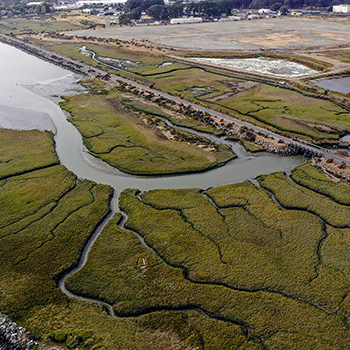
Two Idaho property owners were dumping sand and gravel into wetlands—just 300 feet from a lake—when the EPA told them they had to apply for a permit before filling and building on wetlands. Instead of complying, a right-wing think tank stepped in to support the owners, and they sued all the way to the Supreme Court. Real estate developers and polluters across the country cheered them on.
Given the conservative makeup of the court, the Baykeeper team was concerned. So last fall, we partnered with some of our allies to submit a legal brief in the case to support EPA’s position that wetlands should remain protected under the Clean Water Act.
But the court sided with the anti-environment, anti-regulation plaintiffs in Sackett v. EPA and unfortunately turned wetlands protection into a muddy mess.
For decades, wetlands adjacent to protected waters had been covered under the Clean Water Act. But in this latest move toward deregulation, the court stripped away those protections and put wetlands across the country—and around San Francisco Bay—at risk.
That matters because wetlands are nature's solution to many of the problems facing our waterways, including the Bay. Wetlands filter pollutants and sediment from runoff before it reaches the Bay. They absorb water and help prevent flooding and erosion, which protects Bay Area shoreline communities and infrastructure. They provide vital habitat for countless migratory birds, endangered fish, and threatened wildlife. They are also critical in our battle against climate change. They sequester carbon and serve as buffers against sea level rise, providing protection to coastal areas and reducing the dangers of storm surges.
But now, the court ruled that if wetlands don’t have a continuous visible surface connection to a protected waterway, then they’re not protected under the Clean Water Act. Polluters and developers are free to destroy these wetlands without consequence.
The court disregarded basic hydrology, decades of legal precedent, and the clear language and purpose of the Clean Water Act. Instead, the conservative justices continued their agenda to eliminate regulatory authority and prevent agencies from enforcing environmental protections. The reasoning in this latest decision makes them seem poised to go even further in the future to try to limit the ability of Congress and the EPA to regulate and reduce water pollution.
California agency officials said in news reports that we’re lucky we have state laws to protect our wetlands; however, these measures aren’t anywhere near enough. There are gaps between the federal protections that Sackett gutted and what the state can do to keep the Bay and California’s wetlands safe from pollution.
One of the biggest differences is that the federal Clean Water Act allows public-interest attorneys to take action against bad actors through lawsuits on the public’s behalf. In many cases, this provision is what gives Baykeeper’s legal team the authority to fight polluters on behalf of the public and our supporters. California’s environmental laws and wetlands protections don’t have a similar provision.
I realize my emails are usually more upbeat, but I don’t want to sugarcoat this bad high court ruling. Around San Francisco Bay, we’ve already lost 90 percent of our historical wetlands to shoreline development, and we can’t afford to lose any more.
That’s why Baykeeper is preparing to fight at all levels. Our attorneys will be partnering with allies to strengthen state and local laws to fill the gaps over the coming years. We’ll be advocating for more robust agency enforcement, while also looking to enforce existing laws to protect Bay Area wetlands. We’ll also argue for local courts to narrowly restrict the Sackett decision to clear up these muddy waters. And most of all, we’ll keep up our efforts to investigate and stop polluters, because our Bay—and all its critical wetlands—are worth protecting.